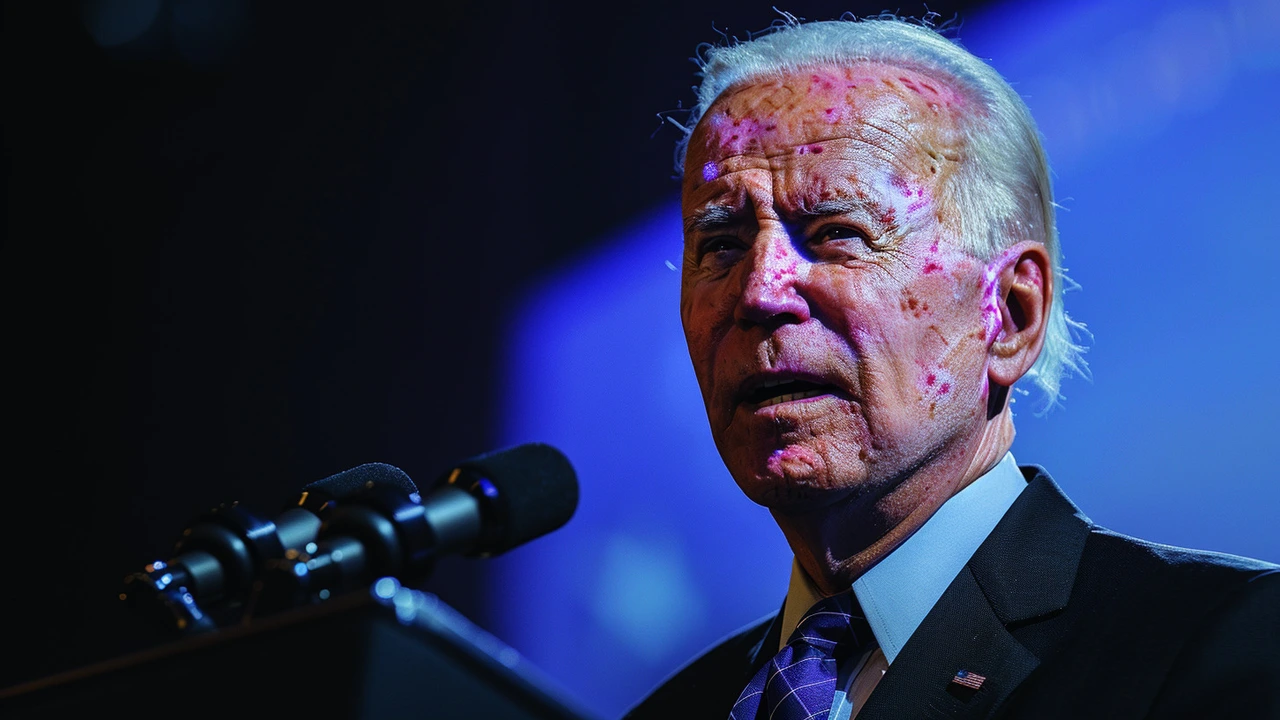President Joe Biden's Tendency Towards Unusual Fabrications
President Joe Biden, the 46th President of the United States, has been a prominent figure in American politics for decades. Known for his folksy demeanor and empathetic speeches, Biden has also gained notoriety for his unusual and often outlandish fabrications. These stories, which frequently place him as the central hero, have raised eyebrows and sparked discussions about his credibility. In this extensive analysis, we'll explore some of the most notable instances of Biden's fabrications and how they play into his broader narrative.
The Mandela Arrest Claim
One of the most talked-about falsehoods from President Biden came during his campaign for the Democratic nomination. In February 2020, he told a crowd that he had been arrested in South Africa while attempting to visit Nelson Mandela in prison. This dramatic claim aimed to highlight his long-standing commitment to civil rights and anti-apartheid efforts. However, it didn't take long for fact-checkers to debunk the story. There was no evidence to support that Biden had ever been arrested in South Africa or that he had visited Mandela during his imprisonment. This left many questioning why he would fabricate such a specific and easily disprovable story.
Exaggerated Civil Rights Involvement
Biden's fabrications aren't limited to his international exploits. On multiple occasions, he has exaggerated his involvement in the American Civil Rights Movement. During his political career, he claimed to have participated in sit-ins and freedom rides, significant actions undertaken by civil rights activists in the 1960s. However, historical records and statements from people who were deeply involved in the movement do not corroborate these claims. While Biden did express support for the civil rights cause, his actual participation was minimal compared to the heroic narrative he has sometimes portrayed.
Misleading Academic Achievements
President Biden has also embellished his academic achievements. In previous statements, he claimed to have earned three degrees from college and to have graduated at the top of his class. In reality, Biden earned a single degree from the University of Delaware and graduated 76th in his law school class of 85 at Syracuse University. These fabrications about his academic history came back to haunt him during his 1987 presidential campaign and continue to be cited as examples of his tendency to distort facts.
The Psychology Behind the Fabrications
Understanding why Biden fabricates such stories can be complex. Political analysts suggest that these fabrications might stem from a deep-seated need to present himself as a relatable and heroic figure. Throughout his career, Biden has strived to connect with the American public on a personal level, sharing stories that humanize him and demonstrate his empathy and commitment to various causes. Unfortunately, this has sometimes involved bending or outright breaking the truth in ways that are easily fact-checked and disproven.
The Impact on Public Perception and Credibility
The bizarre nature of some of Biden's lies, combined with their frequency, has led to a mixed public perception. While some supporters are willing to overlook these fabrications, viewing them as harmless exaggerations, others see them as serious lapses in honesty that call into question his overall credibility. In the current political climate, where trust in leaders is already fragile, such fabrications can be particularly damaging. They provide ammunition for political opponents and fuel skepticism among undecided voters.
It is important to note that politicians from both sides of the aisle have been known to stretch the truth or embellish their records. However, Biden's fabrications often stand out due to their unusual nature and the ease with which they can be disproven. This has led some commentators to label him a 'weird liar,' a term that underscores the strange and often inexplicable nature of his falsehoods.
A Pattern of Embellishment
Biden's pattern of embellishment isn't new. Throughout his long political career, he has been caught exaggerating or fabricating details about his life and achievements. For example, during his time as a senator, he was known to tell a story about how he confronted a gang leader named 'Corn Pop' during his youth. While there is evidence that Biden did encounter a man by that name, the details of the story have been questioned for their accuracy. Similarly, Biden has claimed on multiple occasions to have been instrumental in various legislative achievements, with some of these claims being either exaggerated or outright false.
Reflections on Biden's Veracity
So, why does Biden continue to tell these strange stories? One possible explanation is that they serve as a narrative tool, helping to build a connection with his audience. By positioning himself as a character in these larger-than-life tales, Biden attempts to make his speeches and public appearances more engaging and memorable. However, this approach comes with significant risks, especially in an era where information is easily accessible and quickly fact-checked.
Another factor to consider is the role of memory and perception. As people age, their recollections of past events can become distorted or embellished. Given Biden's long career in public service and the many experiences he's accumulated, it's plausible that he genuinely believes some of the stories he tells, even if they are not entirely accurate. However, this does not fully absolve him of responsibility for ensuring the accuracy of his statements, particularly when they are made in public forums and have the potential to influence public opinion.
The Role of the Media and Public Accountability
The media play a crucial role in holding public figures accountable for their statements. Fact-checking organizations and investigative journalists have been essential in uncovering the truth behind Biden's fabrications. This scrutiny is vital in a democratic society, where transparency and honesty are key components of good governance. However, the media's role is not just to expose falsehoods but also to provide context and understanding, helping the public navigate the complexities of political narratives.
Ultimately, the phenomenon of Joe Biden's unusual fabrications serves as a reminder of the importance of critical thinking and skepticism in evaluating the statements of public figures. While it's easy to be swayed by compelling stories and charismatic speeches, it's essential to examine the facts and question the veracity of the information presented. This vigilance is crucial in maintaining a healthy and informed democratic society.
In conclusion, President Joe Biden's history of strange and often unfounded stories has shaped public perception of his character and credibility. While some view these fabrications as harmless attempts to connect with his audience, others see them as serious breaches of trust. As Biden continues his presidency, the scrutiny of his statements by the media and the public will undoubtedly continue, highlighting the ongoing need for transparency and honesty in political leadership.




Let us strive for truth with unwavering dedication.
Reading through the list of alleged embellishments, I can see why people are divided. Some see these stories as harmless anecdotes while others treat them as red flags. The political arena is full of narratives that stretch reality, and this is just another example.
Oh sure, the “Corn Pop” saga is the pinnacle of statesmanship 😂. If you think that’s the only thing worth dissecting, you’re missing the forest for the trees 😏. Every time a politician spins a yarn, we get a fresh batch of memes, and that’s the real legacy.
From a geopolitical standpoint, the propagation of such hyperbolic narratives undermines sovereign credibility. The rhetorical inflation observed here is tantamount to informational asymmetry weaponization, which jeopardizes national strategic coherence. Moreover, the erosion of epistemic integrity fuels external adversarial exploitation. It is incumbent upon the polity to excise these fabrications lest we compromise the integrity of our democratic epistemology.
It is essential to contextualize these anecdotes within the broader tapestry of American political discourse. While embellishment is not novel, the specificity of the claims warrants scrupulous examination. The historical record provides a more nuanced portrait, and scholarly rigor must prevail over sensationalism.
Ah, the classic “I was there, I saw it” saga-always a crowd-pleaser. In reality, the evidence aligns more closely with the standard political hyperbole playbook. If you’re looking for a reliable source, the fact‑checking archives are a good starting point, though I’m sure the nostalgia factor outweighs the facts for some.
Contrary to popular belief, the alleged arrest in South Africa never transpired. Archival documents from the period, as well as contemporaneous media reports, make no mention of such an incident. Thus, the claim lacks any substantive provenance and should be dismissed as apocryphal.
When a leader ascends the podium and weaves tales of daring escapades, the nation leans in, hungry for mythic grandeur. The allure of the “Corn Pop” legend, the phantom arrest on foreign soil, and the self‑crafted civil‑rights pilgrimages all serve as theatrical props in a grand performance. Yet behind the curtain, the line between memory and fabrication blurs, and the audience is left questioning the very foundation of trust. In the echo chambers of partisan discourse, such stories are amplified like fireworks, dazzling but fleeting. Critics label these narratives as “weird lies,” a tag that both intrigues and alarms. Supporters, however, argue that a pinch of storytelling is a humanizing balm, a relic of a bygone era when politicians were raconteurs. The contemporary media, armed with relentless fact‑checking, acts as the skeptical sentinel, cutting through the fog of hyperbole. Each debunked claim adds another layer to the mosaic of public perception, a mosaic that is anything but monolithic. Historical scholars point out that embellishment is a timeless political tool, wielded by figures across the spectrum. What makes Biden’s fabrications stand out is their specificity and the ease with which they crumble under scrutiny. This paradox-of bold detail paired with fragile veracity-creates a strange cognitive dissonance among voters. Some interpret the discrepancies as harmless quirks, while others see them as indictments of character. The psychological underpinnings may involve a genuine belief in the stories, a desire for connection, or a strategic narrative calculus. Regardless of intent, the cumulative effect ripples through the electorate, shaping both admiration and suspicion. Ultimately, the saga reminds us that truth, in the political arena, is as much a contested battlefield as any policy debate.